Loriculus
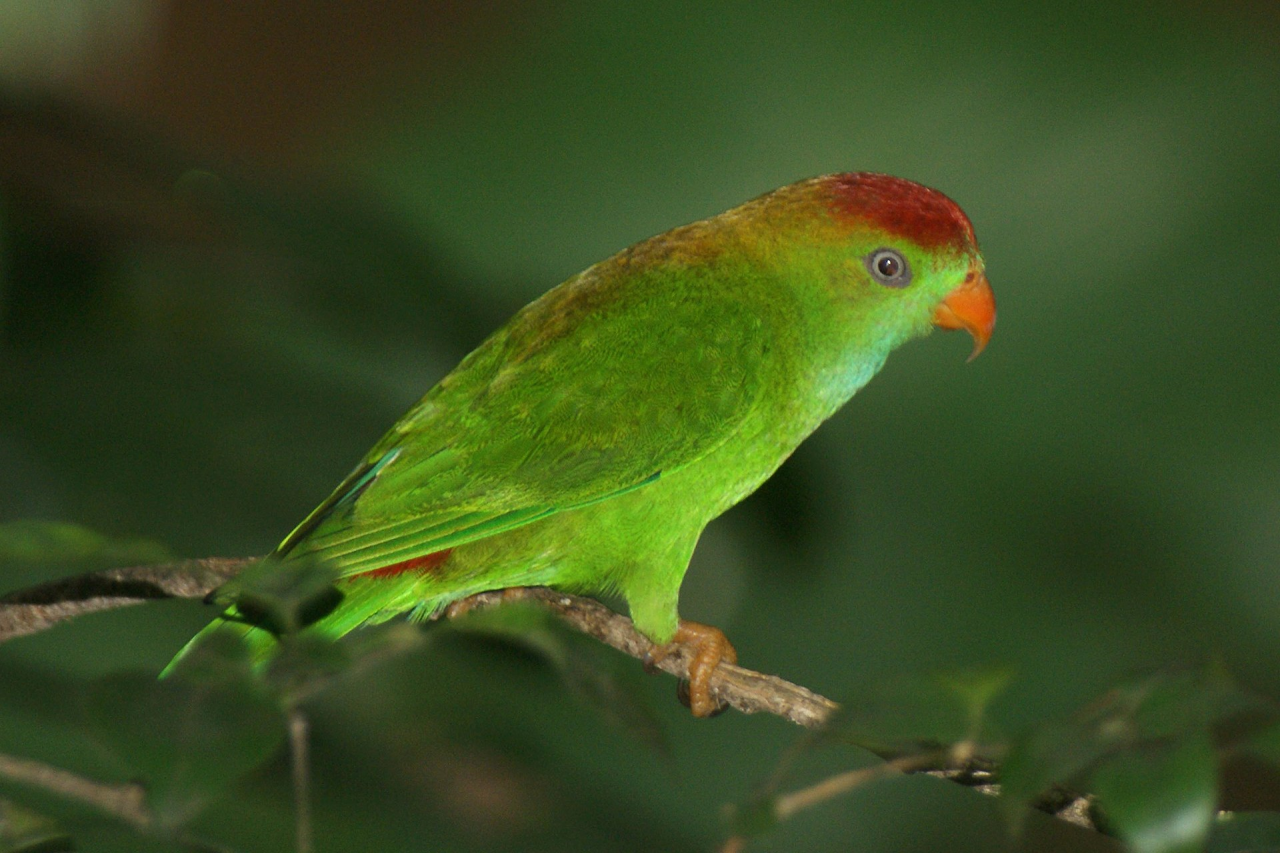
Sri-Lankan Hanging Parrot by Hafiz Issadeen, CC BY 2.0
Etymology: Lory
First Described By: Blythe, 1849
Classification: Dinosauromorpha, Dinosauriformes, Dracohors, Dinosauria, Saurischia, Eusaurischia, Theropoda, Neotheropoda, Averostra, Tetanurae, Orionides, Avetheropoda, Coelurosauria, Tyrannoraptora, Maniraptoromorpha, Maniraptoriformes, Maniraptora, Pennaraptora, Paraves, Eumaniraptora, Averaptora, Avialae, Euavialae, Avebrevicauda, Pygostaylia, Ornithothoraces, Euornithes, Ornithuromorpha, Ornithurae, Neornithes, Neognathae, Neoaves, Inopinaves, Telluraves, Australaves, Eufalconimorphae, Psittacopasserae, Psittaciformes, Psittacoidea, Psittaculidae, Agapornithinae
Referred Species: L. amabilis (Moluccan Hanging Parrot), L. aurantiiforns (Orange-Fronted Hanging Parrot), L. beryllinus (Sri Lanka Hanging Parrot), L. catamene (Sangihe Hanging Parrot), L. camiguinensis (Camiguin Hanging Parrot), L. exilis (Pygmy Hanging Parrot), L. flosculus (Wallace’s Hanging Parrot), L. galgulus (Blue-Crowned Hanging Parrot), L. philippensis (Philippine Hanging Parrot), L. pusillus (Yellow-Throated Hanging Parrot, L. sclateri (Sula Hanging Parrot), L. stigmatus (Great Hanging Parrot), L. tener (Bismarck Hanging Parrot), L. vernalis (Vernal Hanging Parrot)
Status: Extant, Endangered - Least Concern
Time and Place: Within the last 10,000 years, in the Holocene of the Quaternary

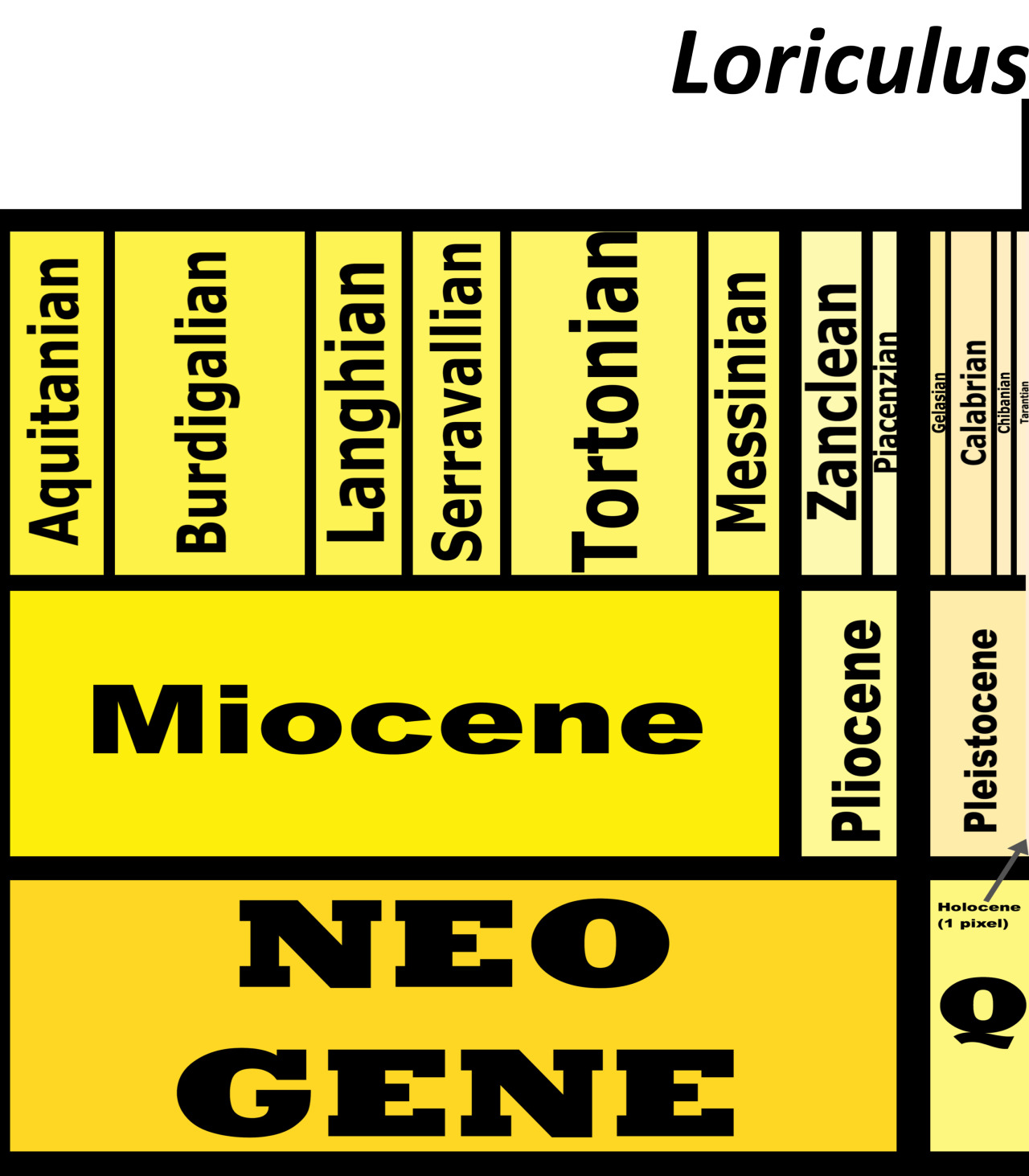
The Hanging Parrots are known entirely from Southeast Asia and the Pacific Islands

Physical Description: The Hanging Parrots are small, green parrots, ranging from 10 to 15 centimeters in length - essentially the same size as their close relatives, the Lovebirds. As parrots, they have small bodies, short tails, feet with two toes pointing forward and two backward, big heads, and strongly curved beaks. Also, as parrots, they are very intelligent and social creatures. These birds are green in general, with a variety of different patches of color on their heads, wings, and tails to distinguish them and look fancy for other hanging parrots. These colors are usually reds, oranges, and yellows; though at least a few have blue patches as well. These birds are usually sexually dimorphic, with the females having fewer patches of bright color than the males.
Diet: Flowers, fruits, nectar, and seeds from a variety of tropical trees.
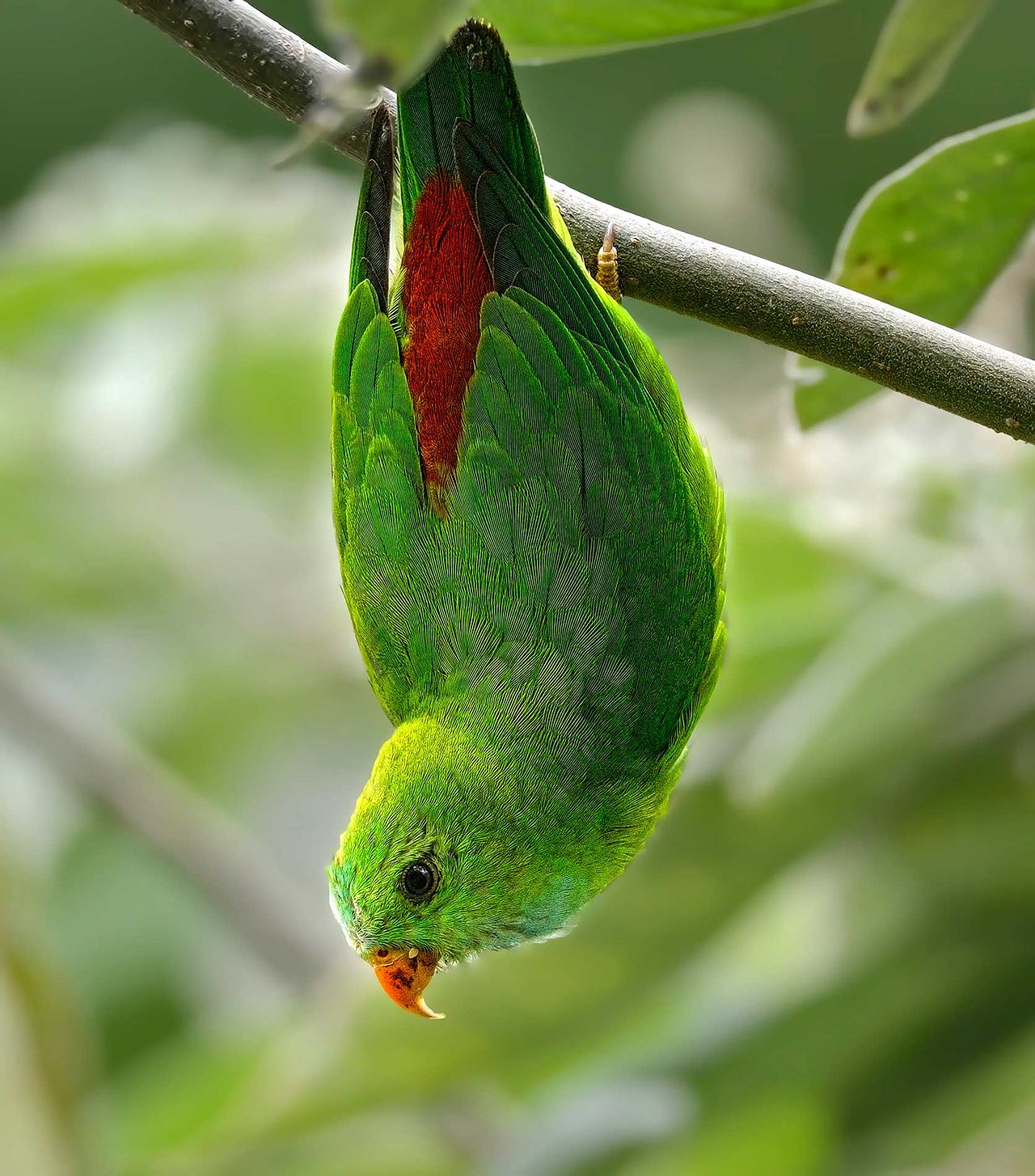
Vernal Hanging Parrot by Raj Dhage, CC BY-SA 4.0
Behavior: These birds are notable from the fact that they hang down in trees and from other high surfaces, often upside down, to reach sources of food in the trees. They are also unique amongst parrots in not only foraging upside down, but also sleeping upside down - they’ll hang, more passively, from branches in order to sleep. This gives them a rather fruity look themselves - like they’re ripe for the harvest, and it’s perfectly adorable. These parrots range from being very social - living in large flocks - to being almost solitary, only ever foraging in pairs during the breeding season and alone during the off season. Very few of these birds will ever go back to the ground, but rather spend all of their time in trees.
These birds make a wide variety of calls, such as tzeet-tzeet-tzeet, squeaky warbles, and twitters. Overall, however, they’re not quite as vocal as other kinds of parrot. Though no species undertakes large-scale migrations, they are somewhat nomadic, moving from tree to tree in search of food, and sometimes going up and down mountains based on food availability.
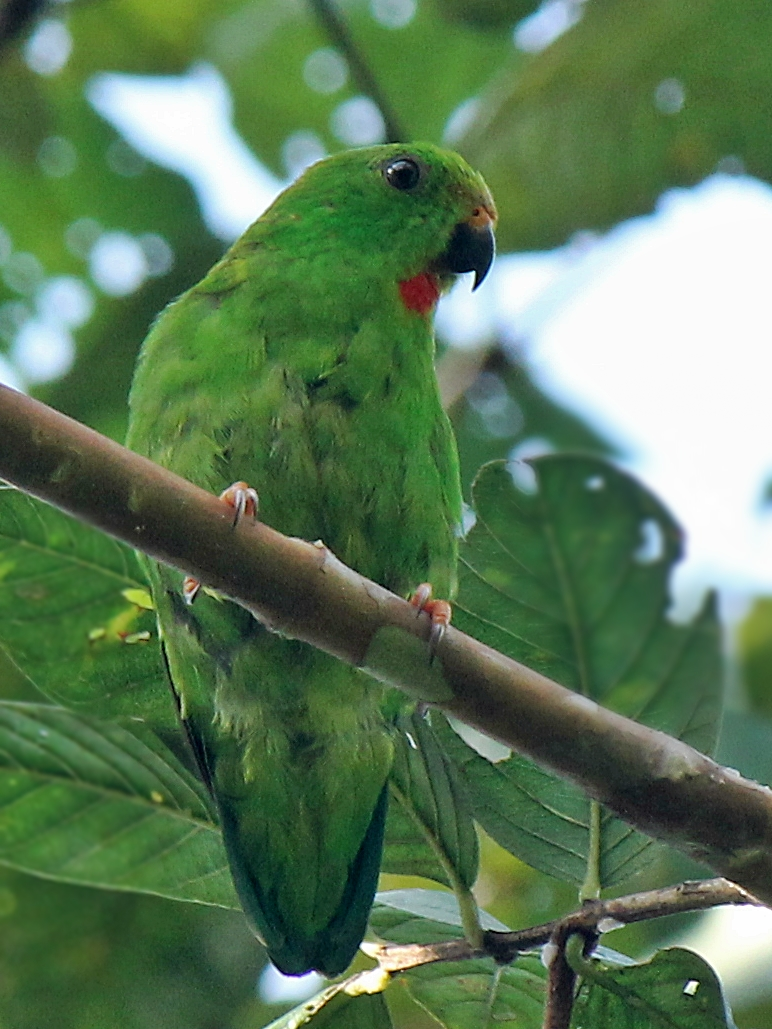
Sulawesi Hanging Parrot by A.S. Kono, CC BY-SA 3.0
The Hanging Parrots generally begin breeding all throughout the year, based on the species - some will start their breeding season in September, others in January, and so on. It really depend son the parrot. They’ll place their nests in holes of bamboo and in tree trunks, anywhere they can keep it relatively high off of the ground. They usually lay only two eggs per breeding season, though at least a few species will lay up to three. They incubate the eggs for about three weeks, and the nestlings stay in the nest for five weeks.
Ecosystem: The Hanging Parrots live in tropical rainforest, throughout the forest itself - some species will be found in denser forests, others in the secondary growth, others at the edge, as well as in peatswamps, near rivers, in patches of bamboo, and mangrove forests. They usually live at lower elevations, though some will migrate to higher parts of the mountains in search of food. They rarely come down from the trees, and spend most of their time at least a few meters off of the ground. Some are also found in tropical dry forests.
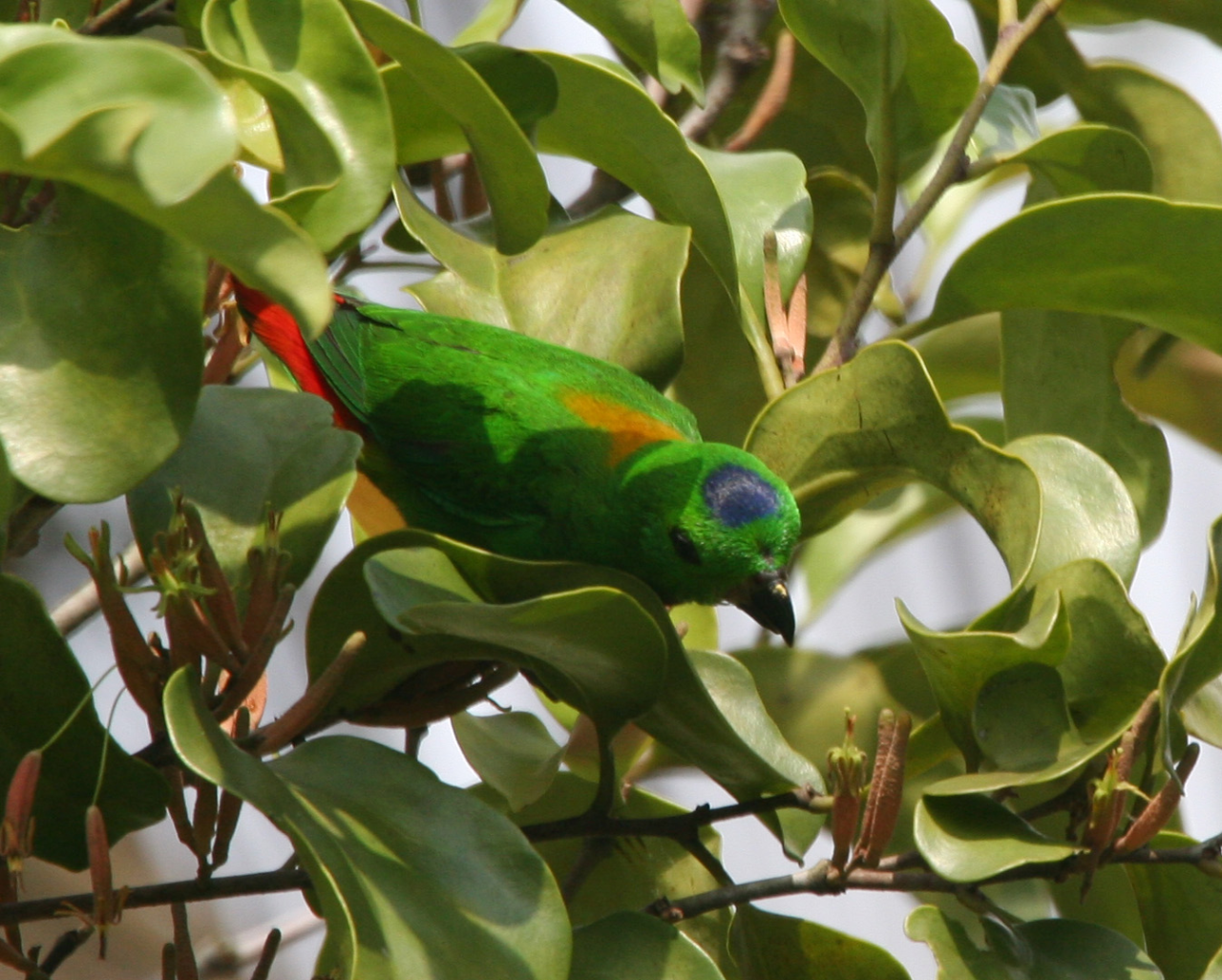
Blue Crowned Hanging Parrot by Kee Yap, CC BY-SA 2.0
Other: These birds are mostly conservationally doing alright, except for some endangerment due to habitat loss. As rainforests and other tropical forests fragment, the Hanging Parrots lose range and ability to contact other parrots, making their populations more vulnerable. Still, only a few species have shown a marked decline in population. At least one parrot, the Camiguin Hanging-Parrot, is rarely ever found. These birds are not good pet parrots, given a wide number of requirements in captivity; however, they are still subject to the illegal pet trade, much to the chagrin of their vulnerable populations.
Species Differences: The Moluccan Hanging-Parrot has a bright red cap on its head and a bright red tail; it mainly lives on the island of Maluku. The Orange-Fronted Hanging Parrot has the same patterns as the Moluccan Hanging Parrot, except it is orange instead of red; it starts breeding in September, and lives in New Guinea. The Sri Lankan Hanging Parrot has an orange top of the head, brown back, and a blue patch on the throat; it begins breeding in January, and lives mainly in Sri Lanka. The Sangihe Hanging Parrot looks very similar to the Moluccan Hanging Parrot, but instead lives in Sulawesi and is a more yellowish green. The Camiguin hanging Parrot is a lighter green, with a light blue patch on its face; it breeds in September, and is known only from the island of Camiguin. The Pygmy Hanging Parrot is the smallest of them all, and only has a red patch on its neck; they breed in February, and live in Sulawesi.
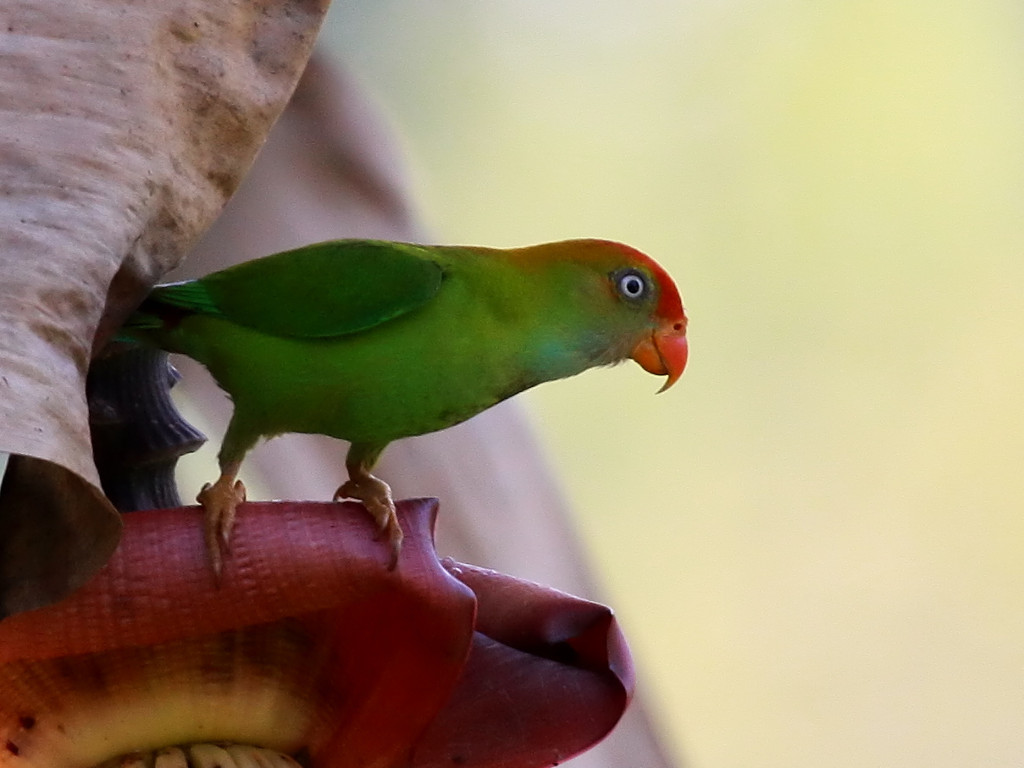
Sri Lanka Hanging Parrot by Thimindu, CC BY-SA 3.0
The Flores Hanging Parrot has red patches on its back, and lives in Java. The Blue-Crowned Hanging Parrot has a distinctive blue patch on its head; it starts breeding in January, and lives throughout Indonesia and Southeast Asia. The Philippine Hanging Parrot has green and yellow orange patches all over, lives in the Philippines, and breeds in March or September. The Yellow-Throated Hanging Parrot has a bright yellow patch on its throat, breeds in April, and lives in Java. The Sula Hanging Parrot has an orange back and lives in Sulawesi. The Sulawesi Hanging Parrot is a lighter green with a brown back, and a red head patch; it breeds in January and April, and lives in Sulawesi. The Bismark Hanging Parrot is a more yellow green with a small red patch on its throat, and lives on the island of New Britain. Finally, the Vernal Hanging Parrot has a light blue throat patch, breeds in January, and lives throughout Southeast Asia and in some patches of the Indian Subcontinent.
~ By Meig Dickson
Sources under the Cut
Collar, N. & Kirwan, G.M. (2019). Bismarck Hanging-parrot (Loriculus tener). In: del Hoyo, J., Elliott, A., Sargatal, J., Christie, D.A. & de Juana, E. (eds.). Handbook of the Birds of the World Alive. Lynx Edicions, Barcelona.
Collar, N. & Boesman, P. (2019). Blue-crowned Hanging-parrot (Loriculus galgulus). In: del Hoyo, J., Elliott, A., Sargatal, J., Christie, D.A. & de Juana, E. (eds.). Handbook of the Birds of the World Alive. Lynx Edicions, Barcelona.
Collar, N., de Juana, E. & Boesman, P. (2019). Flores Hanging-parrot (Loriculus flosculus). In: del Hoyo, J., Elliott, A., Sargatal, J., Christie, D.A. & de Juana, E. (eds.). Handbook of the Birds of the World Alive. Lynx Edicions, Barcelona.
Collar, N. & Boesman, P. (2019). Moluccan Hanging-parrot (Loriculus amabilis). In: del Hoyo, J., Elliott, A., Sargatal, J., Christie, D.A. & de Juana, E. (eds.). Handbook of the Birds of the World Alive. Lynx Edicions, Barcelona.
Collar, N. & Boesman, P. (2019). Orange-fronted Hanging-parrot (Loriculus aurantiifrons). In: del Hoyo, J., Elliott, A., Sargatal, J., Christie, D.A. & de Juana, E. (eds.). Handbook of the Birds of the World Alive. Lynx Edicions, Barcelona.
Collar, N. & Kirwan, G.M. (2019). Philippine Hanging-parrot (Loriculus philippensis). In: del Hoyo, J., Elliott, A., Sargatal, J., Christie, D.A. & de Juana, E. (eds.). Handbook of the Birds of the World Alive. Lynx Edicions, Barcelona.
Collar, N., Kirwan, G.M. & Boesman, P. (2019). Pygmy Hanging-parrot (Loriculus exilis). In: del Hoyo, J., Elliott, A., Sargatal, J., Christie, D.A. & de Juana, E. (eds.). Handbook of the Birds of the World Alive. Lynx Edicions, Barcelona.
Collar, N., Sharpe, C.J. & Boesman, P. (2019). Sangihe Hanging-parrot (Loriculus catamene). In: del Hoyo, J., Elliott, A., Sargatal, J., Christie, D.A. & de Juana, E. (eds.). Handbook of the Birds of the World Alive. Lynx Edicions, Barcelona.
Collar, N. & Boesman, P. (2019). Sri Lanka Hanging-parrot (Loriculus beryllinus). In: del Hoyo, J., Elliott, A., Sargatal, J., Christie, D.A. & de Juana, E. (eds.). Handbook of the Birds of the World Alive. Lynx Edicions, Barcelona.
Collar, N. & Boesman, P. (2019). Sula Hanging-parrot (Loriculus sclateri). In: del Hoyo, J., Elliott, A., Sargatal, J., Christie, D.A. & de Juana, E. (eds.). Handbook of the Birds of the World Alive. Lynx Edicions, Barcelona.
Collar, N. & Boesman, P. (2019). Sulawesi Hanging-parrot (Loriculus stigmatus). In: del Hoyo, J., Elliott, A., Sargatal, J., Christie, D.A. & de Juana, E. (eds.). Handbook of the Birds of the World Alive. Lynx Edicions, Barcelona.
Collar, N. & Boesman, P. (2019). Vernal Hanging-parrot (Loriculus vernalis). In: del Hoyo, J., Elliott, A., Sargatal, J., Christie, D.A. & de Juana, E. (eds.). Handbook of the Birds of the World Alive. Lynx Edicions, Barcelona.
Collar, N. & Boesman, P. (2019). Yellow-throated Hanging-parrot (Loriculus pusillus). In: del Hoyo, J., Elliott, A., Sargatal, J., Christie, D.A. & de Juana, E. (eds.). Handbook of the Birds of the World Alive. Lynx Edicions, Barcelona.
Fjeldså, J. (2019). Camiguin Hanging-parrot (Loriculus camiguinensis). In: del Hoyo, J., Elliott, A., Sargatal, J., Christie, D.A. & de Juana, E. (eds.). Handbook of the Birds of the World Alive. Lynx Edicions, Barcelona.
Jobling, J. A. 2010. The Helm Dictionary of Scientific Bird Names. Christopher Helm Publishing, A&C Black Publishers Ltd, London.















